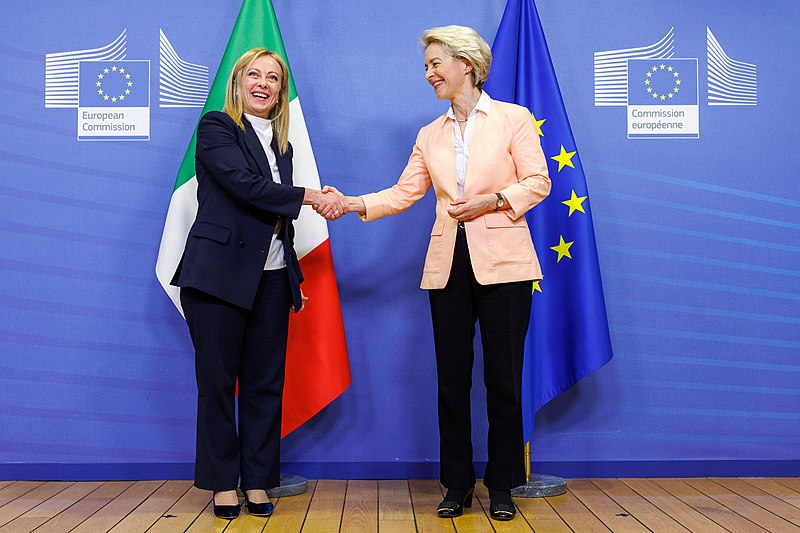Experts warn that collaboration with the far-right has “become the norm” in Europe, as new analysis reveals the extreme right foundations of Georgia Meloni’s EU power block.
The European Conservatives and Reformists (ECR) – a grouping of political parties from across the EU – will oversee the Italian Prime Minister’s attempts to reshape the European Parliament, which reopened earlier this week.
The fourth largest group in Parliament, ECR describes itself as “constructive centre-right” and has been part of Meloni’s efforts to create a more moderate image on the continent.
But new analysis by DeSmog finds at least 63 out of the 78 lawmakers from the group – which has routinely opposed migration and climate measures – are part of far-right or ultra nationalist parties in their own countries.
Multiple MEPs from the ECR were also found to have faced major scandals at home, including trials over corruption and incitement against ethnic minorities.
The findings come as UK Prime Minister Keir Starmer met with Georgia Meloni this week to discuss Italy’s highly controversial approach to processing asylum claims.
Academics told DeSmog that some national parties in ECR were “contributing to the erosion of democracy in Europe” amid fears that the group could hold growing bargaining power following a rightward shift at the ballots in June.
A spokesperson for ECR rejected the claim, adding that, “the parties of the ECR Group are neither nativist nor authoritarian,” and it would therefore “reject the label of ‘far-right’.” The spokesperson also dismissed the allegations about individual MEPs.
DeSmog classified the lawmakers using the PopuList – a database of parties in Europe, developed by academics and peer-reviewed by about 100 experts. At least 81 percent of ECR politicians elected in June were from parties categorised by PopuList as far-right, ultra nationalist, or borderline far-right.
DeSmog also reviewed dozens of news reports and investigations about MEPs from their respective countries, including Finnish MEP Sebastian Tynkkynen, who was found to have been convicted on three occasions between 2017 and 2021 over Islamophobic comments. Carlo Fidanza, who leads the Italian delegation from Georgia Meloni’s Brothers of Italy (Fratelli d’Italia) in the European Parliament, is currently serving a suspended sentence for corruption – an allegation that he denies.
ECR is one of three far-right groups to have gained seats at the election in June. It is dominated by 24 MEPs from Meloni’s Brothers of Italy, and also includes Poland’s Law and Justice (Prawo i Sprawiedliwość) and the Sweden Democrats (Sverigedemokraterna) – all far-right parties – but is often seen as the least extreme of the far-right blocks.
Moderate forces have largely ruled out negotiations with the other groups, including Patriots for Europe, Parliament’s third largest grouping, which includes France’s National Rally (Rassemblement National) and Hungary’s Fidesz. However, the EU’s largest political group, the European People’s Party (EPP), has so far appeared open to discussions with ECR.
EPP Commissioner Ursula von der Leyen on Tuesday put forward Brothers of Italy politician Raffaelle Fitto as a vice-president of the Commission, despite criticism from left wing and centrist lawmakers.
“The ECR group has made a conscious effort to deliver a more respectable self-image, but it doesn’t change their ideological DNA,” Andrea Pirro, co-author of the PopuList report and an expert in extremism from the University of Bologna, told DeSmog. “They hold a nativist and authoritarian worldview, and some of its members have contributed to the erosion of the quality of democracy in their countries.”
“A collaborative stance between the self-professed moderate right and the far right has become the norm,” Pirro added.
Bargaining Chips
The proportion of politicians in ECR from far-right, ultranationalist and borderline far-right groups (82 percent) is likely to be a considerable underestimate of all those with far-right ties.
The figure does not include any of the four independent MEPs in the group, such as France’s Marion Maréchal – niece of Marine Le Pen and former leader of the far-right party Reconquête.
DeSmog also did not count parties that were excluded for technical reasons from the PopuList analysis. Authors of the paper excluded parties that were too young for meaningful classification at the time of publication in 2023, or that did not hold seats in their national parliaments or receive at least two percent of national election votes.
Far-right parties will be hoping to push their agenda on issues such as migration, security and the oversight given to EU institutions. In recent years, the far-right has largely dropped calls for nations to leave the bloc. Instead, it has focused on transforming the EU’s inner workings, as demonstrated by Hungarian Prime Minister Victor Orban’s pledge to “occupy Brussels”.
The EU’s largest political grouping, the EPP, now faces difficult decisions about where to seek majorities on upcoming legislation and amendments, after other moderate forces lost seats in the June elections.
The EPP has faced criticisms over early discussions with the ECR group. In July, the EPP’s president of the European Commission, Ursula von der Leyen, held talks with Georgia Meloni in efforts to secure ECR’s support for re-election – before turning to the Greens to form a moderate majority coalition.
Weeks later, the EPP sided with ECR over the controversial election of Charlie Weimers from the far-right Sweden Democrats as vice-chair of Parliament’s civil liberties group.
The shift follows efforts by far-right parties to present a more publicly acceptable image in recent years. While Meloni has softened her divisive rhetoric since her election in 2022 – ditching claims about the “ethnic substitution” of Italians by migrants and the “LGBT lobby” – experts point to her ongoing hardline policies at home.
Meloni has introduced harsh anti-migration laws, including on minors entering the country. Her party’s manifesto for the 2024 EU election warned against external actors “using migratory flows as a weapon to destabilise governments”.
Brothers of Italy has also been accused of attempting to rewrite the constitution to increase its control of Italy’s parliament, as well as using the national broadcaster for party propaganda.
“Leaving the EU has lost its appeal [following Brexit]”, Andrea Pirro from University of Bologna told DeSmog. “What has changed is that the far-right is more aware of the leverage that they’re able to exert within the working of the European Union.”
Pirro said that the EPP and other parties had also swung further right. “They are trying to woo voters coming from far-right parties. By buying into the far-right’s policy proposals, especially on migration, other parties have contributed to mainstream their ideas. They are partly responsible for the far-right’s major advancements.”
EPP declined to comment.
Anti-climate Stance
The shift in power towards ECR and the right of Parliament following the June elections is likely to signal bad news for the environment overall.
While ECR claims to advocate “protecting the global environment at a cost we can afford”, multiple national parties within the group have links to climate science denial.
Jarosław Kaczyński, the co-founder of Poland’s ECR member, Law and Justice, and Poland’s deputy prime until November last year, has frequently disputed human-caused climate change. In 2022, he claimed that there was no scientific consensus on the subject, and in 2021 stated that its causes were unclear. In August 2023, president of ECR party Greek Solution, Kyriakos Velopoulos, likewise stated there was “no anthropogenic climate [breakdown]”.
More than 99.9 percent of peer-reviewed scientific papers agree that climate change is mainly caused by humans. The Intergovernmental Panel on Climate Change, a UN body of leading climate experts, says we must cut emissions by 60 percent by 2035 compared with 2019 levels to stay within 1.5 degree of heating – a vital threshold for warming agreed by leaders worldwide.
Greek Solution has also launched a vocal campaign against renewable energy in the country. The party shared a post on its Facebook in August 2024 nodding to a widespread conspiracy theory that forests were being burnt down to make way for wind turbines – an unfounded claim that party leader Velopoulos has also spread.
In the European Parliament itself, the group has vocally opposed the Green Deal – the EU’s plan to reach carbon neutral by 2050. Brothers of Italy criticised the “eco-follies of the Green Deal” in its EU election manifesto, while ECR warned against its “unrealistic targets” in its Vision for Europe.
An ECR spokesperson told DeSmog, “The ECR Group does not deny man-made climate change … Instead, we see it as a task that we must tackle together. But we must do so sensibly and with consideration for what is actually feasible and without overburdening citizens. There must be no deindustrialisation and mass job losses, which we are already seeing because of the Green Deal.”
Thomas Waitz, one of Austria’s two Green Party MEPs, who is the party’s coordinator in Parliament’s Agriculture committee, told DeSmog that the rightward shift in the European Parliament would undoubtedly harm progress on climate action.
“There’s going to be a drawback on climate policies,” he said. “It’s already visible. You could see it in the first meetings and votes for the Agri and Envi [Agriculture and Environment] Committees. The majorities have changed.”
National Scandals
DeSmog found that multiple MEPs from ECR had faced major scandals in their home countries in recent years – with several facing internal party investigations or criminal convictions.
Finnish MEP Sebastian Tynkkynen was convicted over Islamophobic comments in 2017, 2019 and again in 2021. Charges in 2017 related to posts stating, “The fewer Muslims in Finland, the better. The less we see of Muslims, it is safer. We have to get rid of Islam before it is too late.”
Tynkkynen is from the Finns Party, members of which have previously been criticised for attending events linked to or involving members of the Nordic Resistance Movement – a violent neo-Nazi network that advocates for eliminating or expelling people who they term “race aliens”, and which the U.S has designated as a terrorist organisation .
ECR stated that “Mr Tynkkynen’s past convictions for online comments on Facebook were related to freedom of speech” and “did not refer to all Muslims, but only to terrorists, extremists and activists of political Islam”. The group also denied any links between the Finns Party and the Nordic Resistance Movement, pointing out that “Mr Tynkkynnen [had] called for the dissolution of the neo-Nazi Resistance Movement in Finland by court order”, in 2016 before the group was banned two years later.
Examples also include Estonia’s Jaak Madison, from the Estonian Centre Party, which is defined as borderline populist but not far-right by the PopuList report. Madison, who was previously deputy chairman for the far-right EKRE party, in 2012 wrote a blog post on “positive” aspects of the Nazi regime.
Despite the party leading the charge to sanitise the image of the far-right, lawmakers from Brothers of Italy have also been implicated in recent scandals.
In June 2023, the party’s leader in the EU Parliament, Carlo Fidanza, negotiated a one year and four month suspended sentence over allegations that he had persuaded an elected official to resign in trade for employing his son in the European Parliament. The plea bargain allowed him to remain in public office – although he has made clear that it did not amount to admission of guilt.
In 2021, Fidanza was also the focus of an investigation by Italian news website Fanpage, in which he was filmed by an undercover reporter explaining that money could be paid to the party under the table and laundered in order to hide its origins. The politician – who was previously part of the youth movement for the neo-fascist Italian Social Movement (Movimento Sociale Italiano), alongside Meloni – was also filmed making a ‘Heil Hitler’ salute.
ECR told DeSmog that Fidanza’s actions had been “distorted by an undercover reporter” and Fidanza had been “ironically imitating a fascist salute and making a joke about himself”.
In February 2024, Italian prosecutors closed their investigation into the corruption allegations after making “no convergent and conclusive” findings for allegations of illicit campaign financing.
Fidanza temporarily suspended himself from all public roles at the time, although he remained in the party, stating: “I have never received illegal funding … I have never had any extremist, racist or anti-Semitic attitudes … I consider it appropriate to suspend myself from all party roles and activities in order to protect Brothers of Italy from attacks that seek to take advantage of the situation.”
Subscribe to our newsletter
Stay up to date with DeSmog news and alerts







